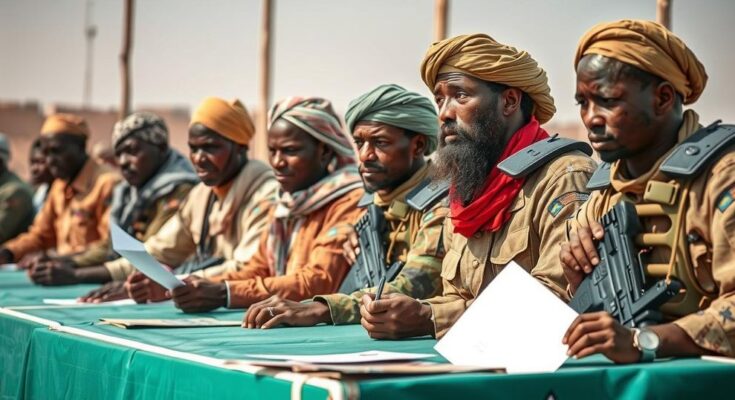Chad’s military and nomadic tribes voted in general elections viewed by President Mahamat Idriss Deby Itno as essential for democratic transition. The elections were boycotted by opposition parties and accompanied by logistical challenges. Initial estimates showed a turnout of about 45 percent among both groups. The elections occur amidst significant security issues, including threats from Boko Haram and controversial government actions.
On Saturday, Chad’s military personnel and nomadic communities participated in general elections viewed by President Mahamat Idriss Deby Itno as a pivotal juncture towards democratization. These elections, scheduled to select national parliament members, regional assemblies, and local councils, were heavily boycotted by opposition parties, who described the process as illegitimate. Voting was organized a day earlier for military and nomadic groups to address logistical issues. Initial estimates indicated about 45 percent voter turnout among soldiers and nomads by midday.
Residents from nomadic tribes expressed their concerns regarding the challenges posed by climate change, including livestock shortages and conflicts with sedentary farmers, which complicate their livelihoods. Sheikh Djibrine Hassabakarim, a representative for the nomads, emphasized the hopes their community places on the elected officials to enhance their living conditions. The elections unfold against a backdrop of insecurity due to Boko Haram attacks and allegations of Chadian involvement in conflicts in neighboring Sudan.
President Deby ascended to power after the death of his father, Idriss Deby Itno, in 2021, and previously secured a presidential term in May that the opposition denounced as fraudulent. The last legislative elections were held in 2011, with several subsequent elections postponed due to various factors including jihadist threats and the pandemic.
Chad’s general elections mark a significant moment in the country’s political landscape, as the military and nomads, who traditionally have been marginalized, are now taking part in a democratic process. Following years of a dictatorial regime under Idriss Deby Itno, his son Mahamat Deby aims to establish a more democratic governance framework. Opposition parties have voiced skepticism about the legitimacy of these elections, citing the lack of a proper campaign and prior electoral fraud as reasons to boycott the voting process. The region faces ongoing security challenges that add complexity to the electoral process, making this situation precarious.
In summary, while Chad’s elections are framed by the government as a step toward democracy, the significant opposition boycott raises questions about their legitimacy. The participation of nomads and military personnel highlights emerging electoral dynamics in Chad, yet concerns regarding living conditions, security threats, and past electoral irregularities underscore the challenges the country faces in establishing a stable democratic framework. The outcome of these elections will be pivotal for the future governance of Chad.
Original Source: www.barrons.com




